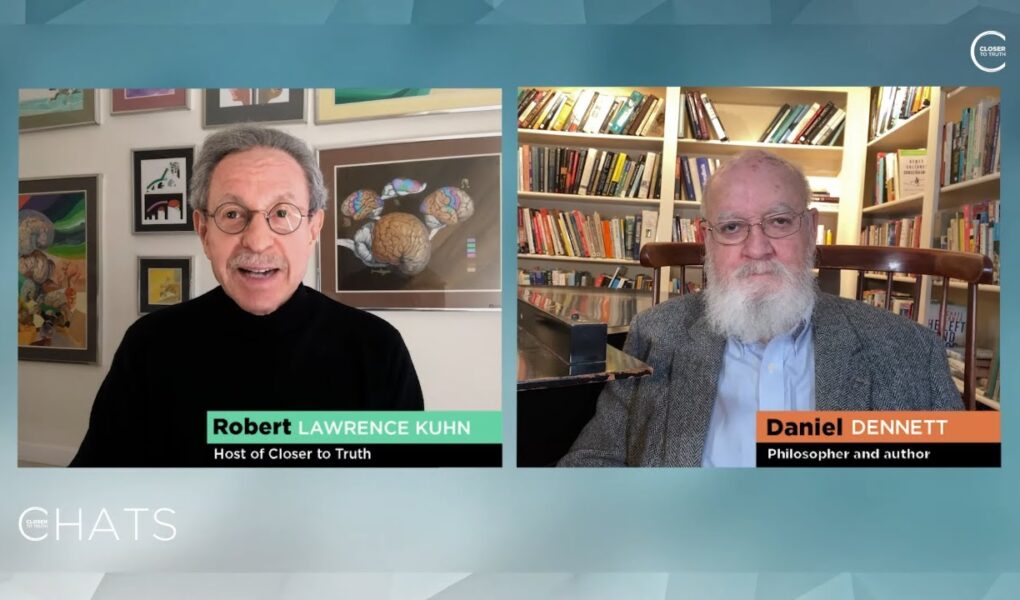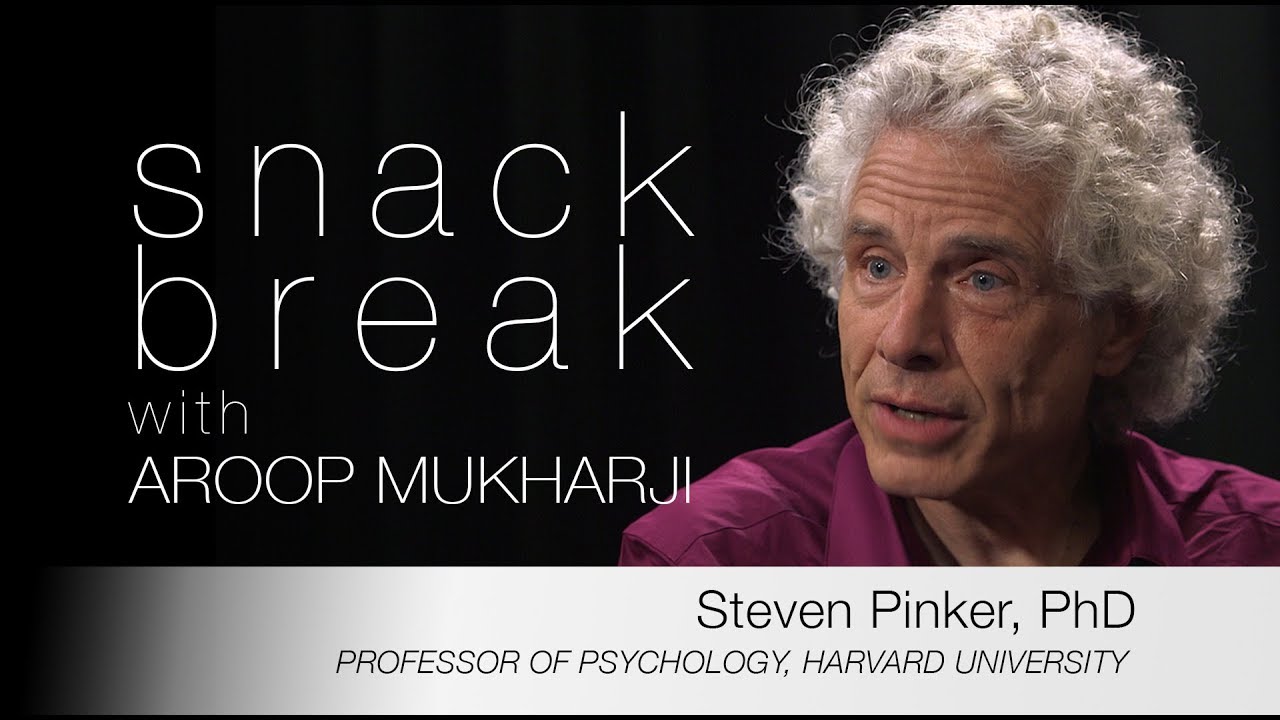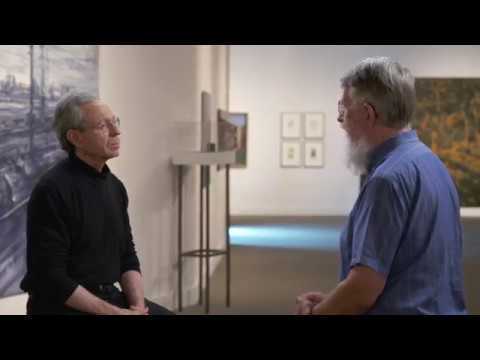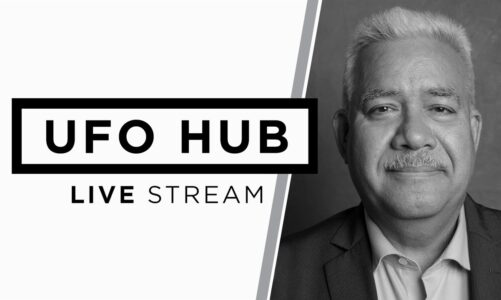Closer To Truth
Daniel Dennett discusses the nature of consciousness, if consciousness is an illusion, artificial intelligence and virtual immortality, and how he covers all of this in his book, Just Deserts: Debating Free Will, co-authored with Gregg D. Caruso.
Just Deserts: Debating Free Will https://www.amazon.com/Just-Deserts-Debating-Free-Will/dp/150954576X
Read an excerpt https://www.closertotruth.com/articles/book-excerpt-just-deserts
Daniel Clement Dennett is a philosopher, writer, and cognitive scientist whose research centers on the philosophy of mind, philosophy of science, and philosophy of biology, particularly as those fields relate to evolutionary biology and cognitive science.
Watch more Closer To Truth interviews with Daniel Dennett: https://bit.ly/2N6W7Me
Register for free at closertotruth.com for subscriber-only exclusives: http://bit.ly/2GXmFsP
Closer to Truth presents the world’s greatest thinkers exploring humanity’s deepest questions. Discover fundamental issues of existence. Engage new and diverse ways of thinking. Appreciate intense debates. Share your own opinions. Seek your own answers.
© 2021 Closer To Truth
Source




Agree with lots of stuff Dennet says but… Not sure he understands "the first person wiew"… If you upload someone's mind/brain/ neurons to some machine,his answer is that that machine/another body/whatever would have OUR first person wiew!? Maybe he knows better but sure doesnt resonate with my wiews.
So what is his theory again ? Basically the same material point of view , with some more fancy details that doesn't get us anywhere close to solving the hard problem …
I find Daniel Dennett so enlightening and enriching. He is clearing up so much 'haze' and confusion. Thank you Closer2Truth for conducting this interview
Dennett is essentially using Panpsychism to explain why philosophical zombies don't exist. Because if his hypothesis is true that there is no difference in computational experience between a zombie brain and a brain with qualia, that means that anything in nature that is capable of computing – which is everything – hence has to have conscious experience. Isn't that basically Panpsychism?
I think I understand why some would be in disagreement, or even be offended by Daniel Dennett. I think he is saying that we are not special. It seems that there is a poeerful drive to be special. Specialness is an illusion. We are just as impermanent as a bacterium.
The realization of our own finitude makes life much more meaningful. Once we fully realize and accept our impermanence it gives us a different quality of thinking. Life increases in value; our life and the lives of others. Could this state of mind be consciousness? Could some people be conscious and most others not?
BUT how do we know that Daniel Denett is not a philosophical zombie tricking us to think that philosophical zombies doesn't exist just so he can be famous?
(just kidding, read his book "Consciousness explained" it's an amazing book).
Dennett is my fave "educated idiot"
Consciousness is the only reason we know it's not completely objective.
I wanna see a debate between Donald Hoffman and Daniet Dennett, it would be a great discussion imho.
'Pan-niftism' is a crap comparison and a straw-man. He already said that each neuron should be considered an agent. One could sidestep his argument in exactly the same way that he is sidestepping the idea that a particle, which can store some information, has an elementary type of agency or proto-agency.
He also often relies on appeals to 'common sense' when he calls things 'nonsense'. This is a failure to really address what he thinks is wrong with the argument.
Daniel Dennett = closed-minded materialist.
Panpsychism is a tautology.
"There is no thinker without the thoughts" – Jiddu Krishnamurti.
Consciousness been a conundrum for nearly a century, but only for materialists who insist that metaphysics is a quaint way of looking at things. Eben Alexander, MD survived an attack by bacteria on his brain, putting him in a coma for a week, providing this trained scientist with his own experience of life after death. On recovery he sat in on the medical discussion about what had happened to him in which he could analyze the consciousness he had experienced in view of what medical science understands. All explanations required a functioning brain, especially a neocortex, which, in his case was being eaten by microbes. He wrote "Proof of Heaven" to share what he had learned from his Near-Death Experience. "I understood how blind to the full nature of the spiritual universe…I had been, who had believed that matter was the core reality. p. 57. I explored this revelation in "Surviving the Micronova."
These guys should read Ryan Holliday, he’s a really good philosopher.
Dan is psudo-intellectual and thinks consciousness is magic.
very good but stopped watching due to loud constant drinking background noice
Even if there is a perfect copy of me, complete with all my memories and experiences and flaws and so forth- that doesn't change the fact that I have a sense of self distinct from, that copy, I have a sense of self preservation, and I'm not going to want to die. No person would voluntarily die because you tell them there's a perfect copy of them back home- like I said that information does nothing to change your sense of being a distinct person all your own. Ppl would be like "Great, then I'll continue to live here and that copy of me can live there." The only way you would stop it is to kill them without their consent. Would that be murder? Who's volunteering for that job? Not me. And I know my luck, you wouldn't barely get done killing me and someone would call "The copy is a dud, don't do it!" – Uh oh- woops.
the anti-philosophic zombie argument at 19:00 fails unless you grant that all software is conscious
Dennett is just ridiculously mislead by his dogmatism. Notice how he doesn't catch obvious counter implications on his own view with the example of "pannyftysm", where he invokes underdetermination by data applied to both theories of panpsychism and pannyftysm. That is to say: if the data can be equally explained by each of the 2 theories, or if the data is not sufficient to adhere to one position instead of the other, then we are not justified to believe that there is preferable theory between the 2. Dennett is just embarissingly refusing to reconsider his own positions which are by now, ancient, and that puts him into a position of insincere, dishonest dumb old wannabe wise man of scientism. It is crazy how he shows complete lack of self awareness when criticising counter intuitive views, while at the other instace he says "scientists seek only for counter intuitive views"
Funny how you'll find those who try to reject the hard problem of consciousness are more of the practical types of human (nerdy types) Daniel Dennett is no nerd but he is overly practical to a fault in my opinion. Although I like Daniel Dennett I argue that the more practically bound you are as a person the more likely you will be a physicalist for the simple reasoning that an extremely practical person is aware of some deficit so to speak and rather than admit that which is no easy thing to do you take the opinion as a future safeguard of that fact ever getting out one day, 'well that may be true about me but it's because there is no free will or everything is causal in nature including me, so you see how that's not my fault.' And those who embrace the hard problem of consciousness have a more relaxed nature so to speak more likely to embrace wonder where extremely practical people in my opinion are incapable of wonder or extremely reluctant to take that path for its own sake. I think it worth mentioning as a seperate claim that people with a narcissistic tint to their characters always take the physicalist viewpoint. I don't feel the need to explain further why they would do that only to say -of course they would try to uphold a bleaker picture in terms of the wonder of man and life.
Dennett is much smarter than I am, but I truly believe he’s just mistaken. His view conflates meta consciousness with phenomenal consciousness and he’s ignoring our a posteriori knowledge… that all is in consciousness! It’s so simple: consciousness is fundamental. It’s so plain and obvious in our experience and there is so much empirical evidence which supports this view as well. Why add all of these layers of complexity and abstraction?! It’s not necessary.
The failure that is going over and over again, is that if you make a perfect copy of yourself into something totally different as a computer, you copy the data, but not the program that it is running on. Even if we have all the data, we don't know anything about the human operating system itself, what drives interactions between neurons so that we become aware of ourselves and implement and use knowledge and experience on a physical layer ( setting as a base, that who and what we are is our brain ). And the interactions from our brain with our eyes, our skin, our organs, the complexity of it all is something we totally don't understand and therefore the idea of copying an amount of data in a computer is a human being is far too much a simple idea. Biological matter like hormones and tissue cant be one on one replaced with silicon based memory and processors. Like Einstein once said, Everything should be made as simple as possible, but not simpler.